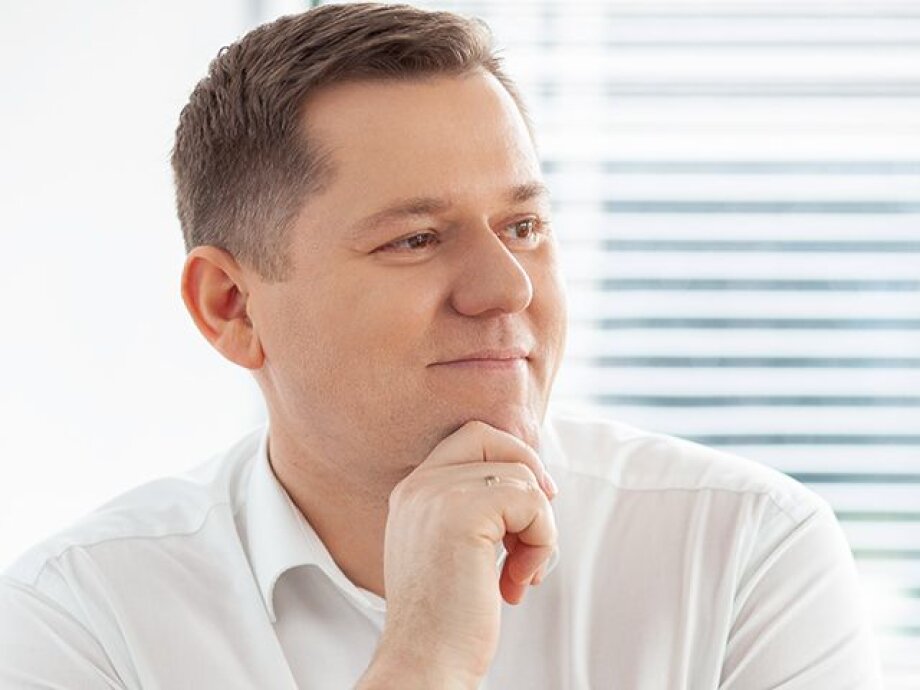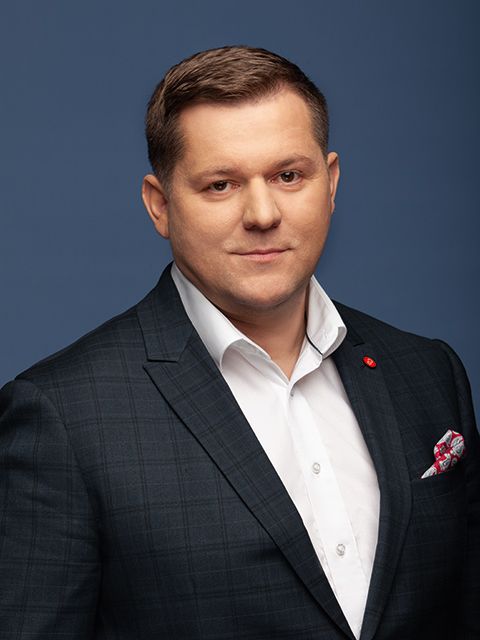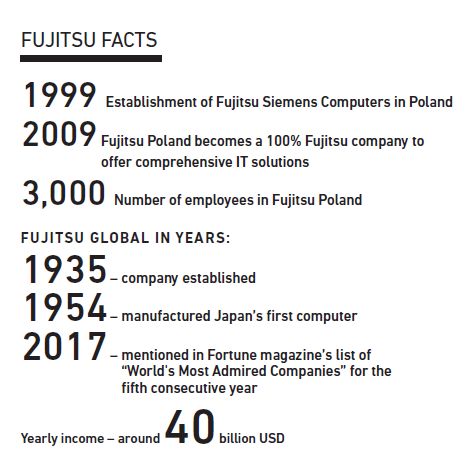Trusted Future
Dariusz Kwieciński, Managing Director Fujitsu Poland, explains how trust became Fujitsu’s key to success in Poland.

Dariusz Kwieciński, Managing Director Fujitsu Poland, explains how trust became Fujitsu’s key to success in Poland.

WBJ: Dariusz Kwieciński, the world of technology is changing fast. How does Fujitsu keep up?
Dariusz Kwieciński: The world of technology is indeed changing at an enormous pace. And with the multitude of different technologies and solutions available, it is impossible to say that we can do everything. It will sound unbelievable. We focus on data protection, hybrid IT and end-user services, and these areas overlap – for example, longor short-term data management includes an element of the processing center and its preparation for the transition to a private or hybrid cloud. It is very important in this case to follow the mottos of Fujitsu: “Human Centric Innovations” or “Driving a Trusted Future”. Some will probably say that these slogans are tall tales and that each company creates its own. However, I mentioned them because they are helpful in self-determination and also when we turn them into an approach to business. It is worth noting that this is not about marketing your own products but about using technologies in such a way that they solve very specificproblems, both in the field of artificial intelligence and data center.
 Where does Poland stand within the Central and Eastern European (CEE) markets? Any major differences?
Where does Poland stand within the Central and Eastern European (CEE) markets? Any major differences?
Of course, from the point of view of business development, some differences are prevalent. But changes also appear in a dynamic and a bit chaotic way. There are several technologies in which we are leaders even compared with Western Europe. However, in the case of CEE markets, each of them has its own specificity. For the Czechs, for example, one can see a great fascination for the German market – the solutions devised there are quickly adopted. The Hungarian market remains a very conservative one – it focuses on the business model and all technological areas are transformed to this level. In the case of Poland, I would say that our geographical location also reflects our approach to business. Someone once told me that Poles watch every innovation very carefully first before they start implementing anything for the needs of their company.
Of course, various waves of innovations come to us from Western Europe – such as cloud computing. However, while the Scandinavians, for example, implemented them practically everywhere very quickly, in Poland public cloud is used very cautiously because firms don’t want to lose control over their own data. The Polish market seems like a mix of the Czech and the Hungarian markets.
Do you think we are more cautious because conservatism is in our national character?
Perhaps our national character is in some way contaminated by some flaws or prejudices from the Communist era. But I would not push it. I have the impression that certain technological innovations are easily accepted in Poland if we talk about the private sphere. However, for companies that spend earmarked funds, it is a completely different story. It seems that the most interesting technology companies are usually small ones and despite this limitation, they are creating an international position for themselves.
Of course, they do not gain traction immediately. Such enterprises simply do not seem to exist in Poland. However, when it comes to technological development, ideas or creativity, we have nothing to be ashamed of. An interesting example is the banking sector, which is thriving, and in addition, it has promoted cashless transactions in Poland to such an extent that many people have stopped using banknotes. Other markets, such as Spain, are behind us – so for this reason, Fujitsu sells a lot of ATM units there.
You have worked for Fujitsu since 2006. For over a decade already. With the benefit of hindsight, where did Fujitsu succeed? What could have been better? Can you say a few words about your professional path?
Could anything have been better? In retrospect, we always see some unused opportunities. Some things could have been solved faster, others may be better. It is also worth remembering that a company like Fujitsu is quite an unusual ecosystem of many related elements. Returning to what could have been different, we can always say that as a company we could have developed faster. One can always ask whether we have skillfully observed the development of the market. When assessing ourselves in terms of results or activity, we have noted growth. I will add that this market’s development, especially in recent years, has been very rapid. We look through the prism of a client’s business problem, which we try to solve based on the knowledge we have.My professional path has been quite interesting. I started my career as a technical person. Then I became the head of the services department. Then I took up sales. And for three years, I have been the head of Fujitsu’s Eastern European part.I honestly admit that I really like what I do and I have always valued the opportunity to broaden my horizons. It seems to me that I have the right mental structure, which on the one hand allows me to be ready for new challenges, and on the other not to be afraid of responsibilities and pressure. You also need a bit of luck in your life. However, I do not like to say that it worked out somehow. Only someone who won a lottery could say that. You need to acquire new knowledge all the time. In my opinion, it is difficult to manage a technology company if you have no idea about technology. I’m a very pragmatic person, which also helped in my professional life.
How is Fujitsu better than its competitors? Where does the room for improvement lie?
We build our relations with customers based on trust. We believe it is the right way to become a trusted advisor to our customers and be able to offer solutions to the challenges customers may have. So we are in a position to advise which of these solutions are the most suitable – often with the help and technologies of our multiple partners – to the specific demands of our customers, after having analyzed the customer environment, current and future needs. Therefore, it is difficult to talk about competition as such, since strict product solutions are often not about competition, but partnerships. Of course, we try to build systems based on our own technologies.
It is a bit different in the case of IT consulting. Although looking at how Fujitsu is developing and the fact that we have large competence centers in Poland, we can easily compare ourselves with the largest ones. So basically we position ourselves in the middle – that is, on the one hand, we are still a technology producer and we want to remain one. As far as I know, there are no plans for something to change in this area. However, we want to use the best practices and all the things we talked about at the beginning. We want to be a company that specializes in solutions that combine technologies and services. Firstly, we respond to customer needs, secondly to technology challenges, and thirdly, we want to find our place on the market that will give us a chance to develop in the coming years. We are addressing today’s needs but also help predict and discuss the future demands that technology may be able to address.
 What technologies do you think will develop?
What technologies do you think will develop?
Anything is possible. It should be noted that all the algorithms associated with building something that we call artificial intelligence is developing extremely rapidly. Bots are beginning to be widely used in various areas, including those related to customer service. Therefore, we are talking about automation with elements of artificial intelligence. When it comes to Internet of Things [IoT – the billions of physical devices around the world that are now connected to the internet, all collecting and sharing data], of course, the world is increasingly populated with various sensors, so this trend will strengthen. We are waiting for the development of real 5G technology and for enabling data transfer many times faster.
In the case of enterprises related to data centers, there is still a lot to do in Poland, the more so because considerable expenses are still incurred for more traditional solutions, although I would not rule out investment in automation here. As for building a real quantum computer, it will definitely happen soon – some say that it has already been created somewhere. Fujitsu has also created something like this to increase data processing speed. If this revolution occurs, the world will become a different place, and what it will look like? One can only expect the development of completely new services related to this technology.
How important is Fujitsu Forum Tokyo for Poland, by which I mean Polish consumers? The event runs from May 19-22, 2020.
The schedule is not known publicly yet, although it is already being planned. It is difficult to say what will be of the greatest interest. I would not expect a Polish element in particular, because it is not an event that Fujitsu perceives through the prism of the countries in which its representative offices operate. This does not mean, however, that our country will be absent. Many products that are created under various working groups and so-called Fujitsu laboratories are the work of our specialists.
For example, the tool for migrating data between different clouds was basically created only with Polish hands, and today it is used in many countries around the world.
Do you foresee the birth of more visionaries?
Spectacular ideas in the world also arose in the years after Google and Facebook were created. A dozen or so years ago nobody promised their creators such a career. Of course, the place of visionaries will always be there, but don’t ask me in which fields. Visionaries should answer this question, and that’s their role. Today such a person is Elon Musk. It is important not to look back but stare at the needs of business users in the present and future. The environment is also important – which I can certify as the head of the part of a company that is the largest employer of Japanese origin in Poland – with over 3,000 employees.
Challenges for the coming years?
The organizational structure of the company is expanding because we also have the competence centers mentioned before in Katowice and Łódź. The latter is the largest of its kind. On the one hand, I am responsible for developing business in Poland and jointly with Polish partners, and on the other, I must ensure that the entire company operates in accordance with national regulations. With this number of employees, this is quite a challenge, because the point is that nobody should feel left out.
All workers have the same rights and receive the same benefits. We also have access to the knowledge and experience of other countries. But above all, it is important that we have competencies we can use in projects for clients from Poland.
What’s the best book you have read in 2019?
Of the industry stuff, I have recently been mainly interested in innovation monetization, but professionally I mainly read a lot of press. In my free time, however, I like to read something unrelated to technology – it can be a combination of a crime, thriller or a horror book. I have read almost all of Stephen King’s books.